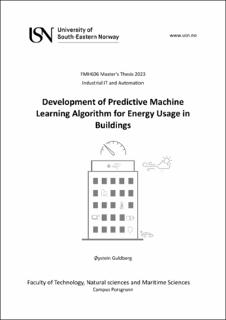| dc.description.abstract | A model for energy usage forecasting can be a tool to help reduce the energy consumed by buildings, and thereby also reduce both the energy costs and carbon footprint of buildings.
In order to create a good prediction model, the inputs containing valuable information are found by data analysis. The data analysis mainly uncovers that the training data in this project contains certain cyclical patterns for daily, weekly, and yearly variations. And that one of the most important parameters influencing changes in energy consumption is cooling caused by the outdoor temperature.
This thesis investigates using two different machine learning algorithms to create energy consumption models for daily and hourly energy predictions. The first model type is long-short term memory (LSTM) and the second is gradient boosted machines. Which model type produces the best results will depend on the building, and the desired prediction horizon which may be the next hour, day, or month.
The data used for model training in the project is recorded from two separate buildings located in Athens, Greece. Where the best predicting model for building #1 is a LSTM model with a MAE of 608 kWh (about 15% of test set mean), and for building #2 a gradient boosting model with a MAE of 1208 kWh (about 8% of test set mean). | |
